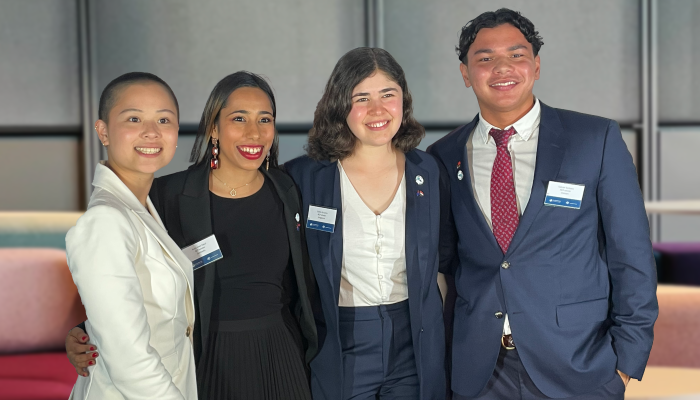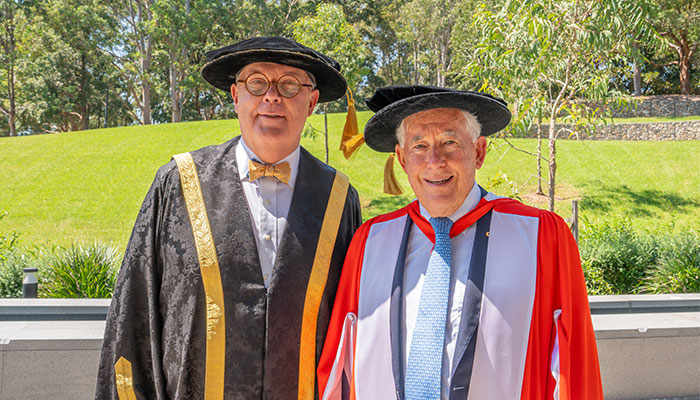“What are the safeguards on democratic liberties if Parliament itself is complicit in expanding executive power to the detriment of the judiciary and ultimately of all Australian citizens?” asked Emeritus Professor Gillian Triggs in her keynote address at the recent Tony Blackshield lecture.
The event, which was attended by more than 130 alumni, recognised the legal education legacy of guest of honour, Emeritus Professor Tony Blackshield AO, who throughout his career personified Macquarie Law’s commitment to social justice. A renowned scholar, public intellectual and thought-leader who literally wrote the book on Constitutional Law in Australia, Professor Blackshield also delighted the assembled guests with one of his famous impromptu performances – in this case part of Lord Atkins’ speech about who in law is more his neighbor, set to Schubert’s 9th Symphony
The illustrious audience was a reminder of the impact Macquarie Law graduates are having on Australia. With over 8,000 alumni, the Law School alumni community includes: three out of five of the chief judges in the NSW Judiciary,; the NSW and Commonwealth Directors of Public Prosecutions; the incoming president of the Law Council of Australia; numerous eminent partners at distinguished law firms and luminaries across many fields of human endeavour.
Fair go
Social justice is becoming an issue of increasing focus across Australia as shifting global politics have profound impacts on local policies and decision-making processes.
“Prioritising government power has become a routine part of the legislative process, stimulating very little community or media response,” Professor Triggs, President of the Australian Human Rights Commission, said during her speech, referring to the legislative exclusion from review of all decisions relating to national security, counterterrorism and migration laws.
She also shed light on why Australia has become increasingly isolationist and exceptional in its approach to the protection of human rights. She then explained why she is optimistic and why she believes there is still an underlying public appetite, as well as a possible solution, to redress this.
“One of the most effective safeguards of human rights is the cultural expectation of Australians is that our freedoms will be protected,” she said. “While most Australians are highly unlikely to be able to describe the Doctrine of the Separation of Powers they’re quick to assert their liberties under the rubric of a ‘fair go’ – a phrase that is as close to a Bill of Rights in this country as we’re likely to get, at least in the short term.
“The scores of laws passed recently that infringe our rights has confirmed my view that Australia needs to reignite the discussion about some form of legislated charter of rights.”
Absolute power
Professor Triggs’ far-reaching talk also raised the issue of executive overreach: “The government has been passing tranches of new counterterrorism laws and those laws needed to be reformed… [however]…many counterterrorism laws introduced with unseemly haste go well beyond what might be deemed to be proportionate and are having a chilling effect on freedom of speech and press and breaching the right to privacy.”
Under current law, she says, the minister has the power to revoke citizenship if there is a conviction for specified offences, “but it’s now proposed that the subjective views of a minister will be elevated above an evidence-based determination by a judge.
“Is it consistent with the rule of law for Parliament to pass legislation to withdraw citizenship automatically subject to the discretion of the Minister?” she asked. “I suggest that to do so is contrary to the international covenant on civil and political rights, Article 12.4 which protects the right to enter and remain in one’s own country.”
Professor Triggs concluded by stressing the importance of educating young Australians to understand the significance of both constitutional protections for democracy and international human rights law.
“I believe we [also] need to invest in Parliament as a vital institution to protect our rights and freedoms, through education – even of our parliamentarians – and I think we need stronger powers for the Parliamentary Scrutiny Committee to insist that its recommendations are taken fully into account by Parliament,” she said.
The full broadcast and photos of the event, including the stimulating Q and A session and Professor Blackshield’s overview of historical changes in migration law for political purposes, are available online.
The event, which was attended by more than 130 alumni, recognised the legal education legacy of guest of honour, Emeritus Professor Tony Blackshield AO, who throughout his career personified Macquarie Law’s commitment to social justice. A renowned scholar, public intellectual and thought-leader who literally wrote the book on Constitutional Law in Australia, Professor Blackshield also delighted the assembled guests with one of his famous impromptu performances – in this case part of Lord Atkins’ speech about who in law is more his neighbor, set to Schubert’s 9th Symphony
The illustrious audience was a reminder of the impact Macquarie Law graduates are having on Australia. With over 8,000 alumni, the Law School alumni community includes: three out of five of the chief judges in the NSW Judiciary,; the NSW and Commonwealth Directors of Public Prosecutions; the incoming president of the Law Council of Australia; numerous eminent partners at distinguished law firms and luminaries across many fields of human endeavour.
Fair go
Social justice is becoming an issue of increasing focus across Australia as shifting global politics have profound impacts on local policies and decision-making processes.
“Prioritising government power has become a routine part of the legislative process, stimulating very little community or media response,” Professor Triggs, President of the Australian Human Rights Commission, said during her speech, referring to the legislative exclusion from review of all decisions relating to national security, counterterrorism and migration laws.
She also shed light on why Australia has become increasingly isolationist and exceptional in its approach to the protection of human rights. She then explained why she is optimistic and why she believes there is still an underlying public appetite, as well as a possible solution, to redress this.
“One of the most effective safeguards of human rights is the cultural expectation of Australians is that our freedoms will be protected,” she said. “While most Australians are highly unlikely to be able to describe the Doctrine of the Separation of Powers they’re quick to assert their liberties under the rubric of a ‘fair go’ – a phrase that is as close to a Bill of Rights in this country as we’re likely to get, at least in the short term.
“The scores of laws passed recently that infringe our rights has confirmed my view that Australia needs to reignite the discussion about some form of legislated charter of rights.”
Absolute power
Professor Triggs’ far-reaching talk also raised the issue of executive overreach: “The government has been passing tranches of new counterterrorism laws and those laws needed to be reformed… [however]…many counterterrorism laws introduced with unseemly haste go well beyond what might be deemed to be proportionate and are having a chilling effect on freedom of speech and press and breaching the right to privacy.”
Under current law, she says, the minister has the power to revoke citizenship if there is a conviction for specified offences, “but it’s now proposed that the subjective views of a minister will be elevated above an evidence-based determination by a judge.
“Is it consistent with the rule of law for Parliament to pass legislation to withdraw citizenship automatically subject to the discretion of the Minister?” she asked. “I suggest that to do so is contrary to the international covenant on civil and political rights, Article 12.4 which protects the right to enter and remain in one’s own country.”
Professor Triggs concluded by stressing the importance of educating young Australians to understand the significance of both constitutional protections for democracy and international human rights law.
“I believe we [also] need to invest in Parliament as a vital institution to protect our rights and freedoms, through education – even of our parliamentarians – and I think we need stronger powers for the Parliamentary Scrutiny Committee to insist that its recommendations are taken fully into account by Parliament,” she said.
The full broadcast and photos of the event, including the stimulating Q and A session and Professor Blackshield’s overview of historical changes in migration law for political purposes, are available online.



